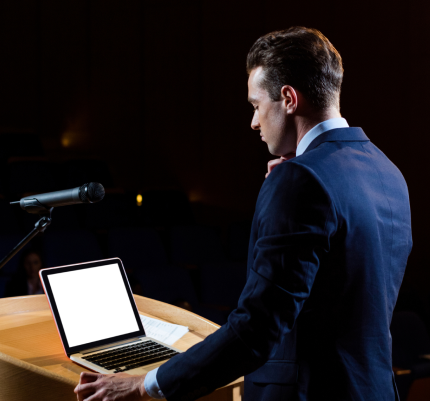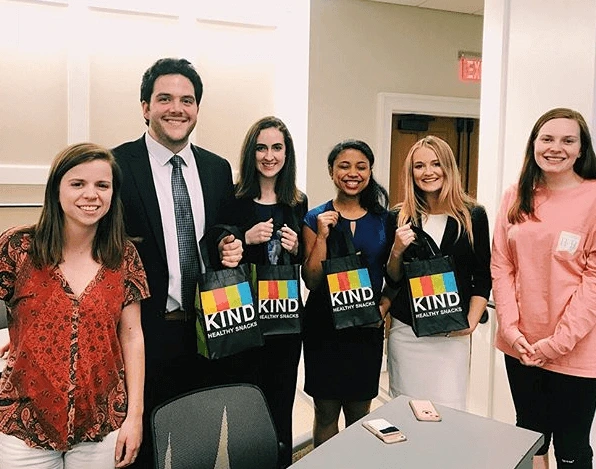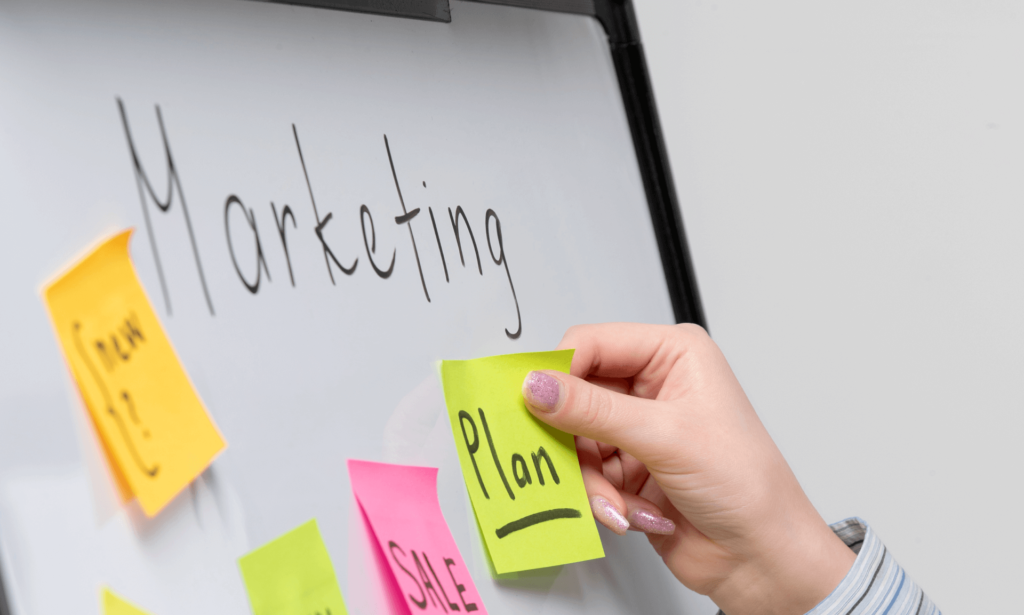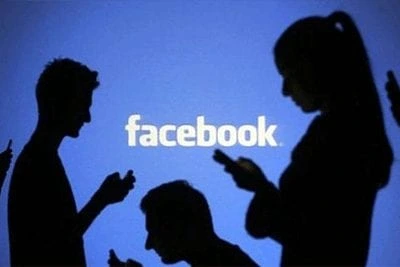Thanks to the Fairfield County AMA some of the NY chapter were lucky enough to hear Gary Briggs, CMO of Facebook, speak a couple of weeks ago. This was an exceptionally intimate and low-key event because it was held in conjunction with King School in Stamford – Gary was invited back to his old school to speak in honor of its 150th anniversary. He grew up in Connecticut and worked at PepsiCo, before making his way to California and Facebook via IBM, a start-up and eBay. Gary’s topic was ‘Thriving in A Rapidly Changing World’.
Gary Briggs identified events that were tipping points for him. When the Mac first came out. “The idea that this was coming to your desk and you create ideas with it was amazing. It gave creativity to everyone.” The first banner ad – from a company in Westport. The appearance of services that connect the world but are free, relying on advertising to make money – Google, Instagram. A speaker in 1996 steering PepsiCo away from the internet, back to TV (this was when he left). His first start-up, sold to Amazon for very little but “What I learned what the nature of what the web was going to be and how you can market using the web”.
The world has changed in extraordinary ways. 20 years ago is when the Internet really started, not that long ago. But now, smartwatches have 10 or 20 times the power of the original Mac. Products that connected a tablet to a watch were only found on Star Trek – now we can all have them. The cost of operating e-commerce was very expensive – you had to pay hundreds of thousands of dollars to buy servers. Today “costs are evaporating fast”, anyone can rent a server. This has a lot to do with the emergence of next-generation companies.
What is happening now?
The end of digital, because everything is digital. “In Silicon Valley, we don’t use the word ‘digital’ anymore. It just is”.
The transition of internet usage from desktop to mobile, especially in countries like India and China. The mobile internet is a multi-billion-dollar revenue stream that was not there a few years ago. This shift has happened since 2012. “This is how fast the phone has changed the structure of technology”. The phone is becoming the primary device for conducting business. Mark Zuckerberg wrote his letter to investors for the IPO on his phone. By a significant amount, more people are using their phones for data than for voice.
The disruption of driverless cars. Tesla may or may not be successful, depending on their ability to produce a mid-priced car, but the idea of being on the road with cars that drive themselves is big. “If you start to be around people in driverless cars, you’ll start to see that being in a traffic jam surrounded by people who are driving their cars is also kind of crazy.” A lot of people are on their phones, not paying attention, and they aren’t in a state where they should be operating a car. Driverless cars will have a huge impact on only on how we drive around, but on what an asset is.
“The nature of what an asset it – what you actually need to have, is starting to change.”. During the world cup in Brazil, 70% of the hotel rooms came from Airbnb. It only has $900M revenues this year but has promised $10 billion by 2020. The definition of an available room has started to change. “You don’t have to have a hotel tower and have people run that”. Traditional hotel companies are under pressure. Marriott and Starwood are merging.
Uber has been shunting the taxi aside, despite resistance, and is making car ownership less and less important. And Uber is working with Tesla to eventually switch to driverless cars.
Amazon has been disrupting for a long time. Now, when you start a business, you don’t have to buy servers, ‘you don’t actually have to buy anything. You just have a relationship with Amazon and eat what you want to eat” and can add extra bandwidth at low cost. Netflix has grown this way. All this has started to have a huge impact on businesses with large stores. Staples is merging with Office Depot. That merger was turned down when it was first proposed from the FTC – there’s no question of this now.” When you’re competing with a company with no physical store, it’s going to be a unique battle.”
What does this mean for all of us?
- The end of the need to own things. Ownership is being replaced by renting, whether it’s a car, a bicycle, books, a hotel room or web services. “Do you actually need a car, do you need a hotel room, do you need all these assets you are used to having?”
- It is easy to find things, e.g. a unique light bulb.” I type in the number and there it is. I don’t have to hunt for it.” It’s disrupting many industries at a rapid rate. Information will be everywhere. You are surrounded by information on your phone, computer, etc.
- New types of entertainment and interaction. Google Glass may have failed but they are not going to stop. Virtual reality will change many things. If you watch a movie in VR, it will change the way you are entertained. “Imagine being able to talk with someone through VR. We could be across the world but play Ping-Pong with each other.” As costs go down and resolution goes up, it’s going to be big.
- The nature of learning is evolving. Business schools are looking at 1-year programs and extension programs. People need to learn at various stages of your life. When you’re 33 with a family and an income, the opportunity cost to leave that and go to graduate school is quite high. Start-ups are getting into the education business and hiring top professors. The former president of Yale is now the CEO of one of these companies.
- The nature of careers is changing. “My dad was at the same company for about 30 years and when he was 59 he was laid off”. With big industries being disrupted, career agility will become more and more important.
- The nature of global connection is also evolving. It is becoming increasingly important to have relationships with people around the world and working those to pursue your career. “Our zip code no longer determines who we talk or interact with.”
- Learning languages is becoming less important. “One day, we will be able to talk to people around the world through computers in real time.”
- More emphasis on health and wellness instead of treating illness. Both mental and physical health are becoming more important, people are investing in preventative health, hoping to live and work longer.
- Greater value placed on downtime. “A lot of what we do everyday is so filled with technology, I think we need downtime and down space between time”. Think what else you could do in the time you spend driving your car.
The nature of what an asset is starting to change fundamentally. People are placing more value in experiences than assets, and placing more emphasis on investment in experiences than say buying a car. The companies who succeed for the future will be those who understand this and who do not underestimate the long term.
How does Facebook fit into all this? What is Facebook’s long-term ambition? The management of Facebook is still young. Marcus is 31, and started the company when he was 19. Gary is 52 and his boss is 33. There’s a lot of future for them to think about. Here are some of the things they are focused on now:
- Developing Facebook’s own virtual reality-based operating system (Oculus). It is starting as a gaming system but they see it as potentially the next OS.
- Phone apps. “We have Facebook, messenger, WhatsApp, and Instagram. We’re an important part of your phone now”
- Connecting the world. 85% of the world is in reach of a cellphone tower. The rest probably know what a cellphone is, but they can’t afford it. “Our apps are free because we believe that’s what it takes to connect the world”. Facebook believes that, “If people have more information the world can be better.” Many Facebook users are people from countries who don’t trust the information their governments are giving them, and the look to Facebook to provide outside information. “This is pretty amazing and this is what we want more of”.
- Balancing data freedom and privacy issues. According to Gary, people value their data less than they say they do, “We looked into what people are willing to pay with data for a service and there is a significant gap, which tells people that people don’t value their privacy as much as they say they do. Their behavior doesn’t match their words” But dealing with governments is a huge issue.
And what is Gary Brigg’s view of the CMO role?
Facebook has taken a lot of marketing communications in-house. “When I started, I created an in-house agency so now we create most of our projects internally. When you go on Facebook, messenger, etc., and you see an ad for Facebook, that’s us. “However, the CMO role is mostly limited to product communications. Growth Marketing runs separately.
Gary believes that other companies are not evolving fast enough. “Other heads of marketing haven’t made that shift to digital.” He gave the example of a recent meeting with a very large retailer. Out of 5 ad campaigns, they presented only one had a Facebook component. They then mentioned that all of their supply chain is built off a TV channel. There are exceptions, such as Sport Chek, which has reconfigured its supply chain in order to shift heavily to digital. “Very few companies are making these changes. I think that this is why companies like Nordstrom, Staples, etc., are being so disrupted. They aren’t shifting fast enough”.
Gary’s advice for career seekers: “One CEO of a retail company I asked, ‘what would you do if you didn’t have any stores?’” and he looked at me like he never thought of that question. And I thought, ‘you’re in trouble.’ If you run across people like that, don’t go there.”
 About Joanna Seddon
About Joanna Seddon
Joanna is AMA New York’s Immediate Past President. She leads the global brand consulting practice for OgilvyRED with assignments across the global network. She specializes in helping clients maximize the financial potential of their brand and marketing strategies. She is recognized as a global expert on brand creation and growth strategies, brand architecture, and brand valuation. She has more than 20 years of experience in providing strategic recommendations with measurable financial impact to leading clients worldwide.
















 About Joanna Seddon
About Joanna Seddon